NRL 2022: Greg Alexander is right with Melbourne Storm hip drop claims, Paul Kent
Greg Alexander and Cameron Smith have butted heads over claims Melbourne invented the hip-drop tackle, and history shows Brandy is in the right, writes PAUL KENT.
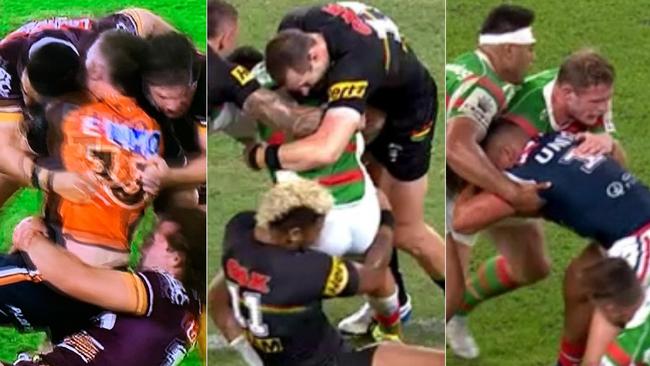
Opinion
Don't miss out on the headlines from Opinion. Followed categories will be added to My News.
It was somewhat pleasing to listen and see during the week that a new media war had broken out in this great game of rugby league and, after perusing the fine print and associated articles, discovering this Keen Observer was not part of the skirmish.
Not even Buzz managed to find his way into the crossfire.
Instead, the hallways grew a little cooler in there at SEN this week when Greg Alexander raised what many considered the fairly standard idea that it was the Melbourne Storm that first introduced the hip drop tackle before he naively moved on with his business.
This caused considerable angst for the Great Cameron Smith, recently retired but still closely attached to the Storm as evidenced when a grandstand in Melbourne was recently baptised in his name.
Stream every game of every round of the 2022 NRL Telstra Premiership Season Live & Ad-Break Free During Play on Kayo. New to Kayo? Start your free trial now >
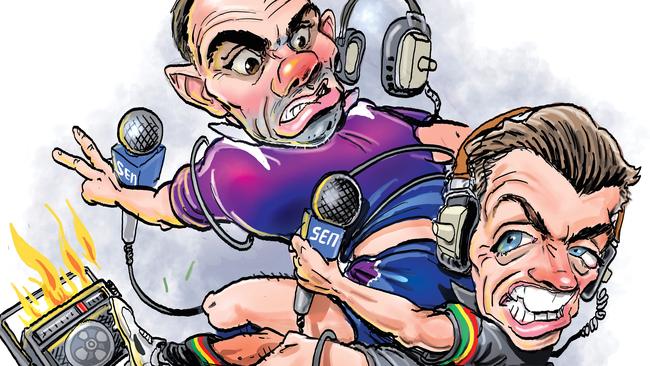
“I just don’t know how he came up with that comment,” Smith said a day later on the same radio frequency.
“To single out one club and to say that they introduced that tackle into our sport, that’s a little bit over the top.
“I can’t ever recall seeing Brandy at one of our training sessions throughout my career and my 20 years at Melbourne. I can’t recall him ever being at training.
“I work with Brandy on our radio station and he’s a great fellow, but to single out the Melbourne Storm, that’s really unfair. Really unfair.
“To say that a club or even clubs now are practising or teaching their players to fall into the back of legs, I think that’s a little bit over the top.”
On Friday, Alexander fired back. His retort was built on nothing but common sense.
“These tackles over the last 20 years, all the different types of techniques, they appear in the game and it takes the game a little while to catch up to them,” he said on SEN.
“I think history shows, and it’s not a stretch for me to jump to a Melbourne Storm conclusion, that for 20 years, the grapple, the chicken wing, the rolling pins, the crusher, the hip drop … I think they all emanated out of Melbourne.”
We wait for Smith’s return of fire.
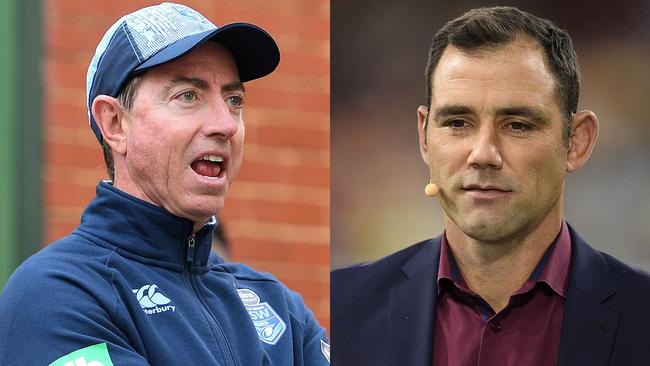
Meanwhile, Smith has become one of those Scientology soldiers, a fierce defender of the faith whose ferocity is beaten only by the speed of his return.
The Melbourne Occult has operated this way for some years now. Any criticism of the club is swiftly fired back upon, and the closer to the truth the criticism, the more ferocious the response.
It can be a tough battlefield to navigate.
Smith is a bona fide great. His status in the game will never be questioned. It doesn’t waterproof his opinions, on the other hand.
So whenever Smith is talking about Storm, and particularly the Storm era in which he played, a large spoonful of scepticism should be applied.
He protects the Storm reputation, as he should.
But Alexander is right. The Storm fail to realise the NRL is fuelled on gossip and jealousy and coaches peeking over each other’s back fences to see what the other is up to now.
That’s how they’re slowing the tackle down? We will do it, too.
There are three head coaches in the NRL – Brad Arthur, Kevin Walters and Adam O’Brien – who worked as Storm assistant coaches. Michael Maguire made it four before he left the Tigers mid-season, which brought the number to a quarter.
Several more assistant coaches at various clubs also came through the Storm. Countless others have come and gone, to say nothing of the players who have left to join rival clubs.
Given Melbourne’s dominance for the best part of two decades, it would be naive to think those coaches and players have not taken those methods to their new clubs.
Or those ex-players becoming assistants at other clubs have not also suggested it.
Or those players migrating from the Storm to another club haven’t stuck a hand up and said, “Well, when I was at Melbourne …”
In other words, you don’t need to witness the Melbourne dojo sessions for confirmation of what happens there.
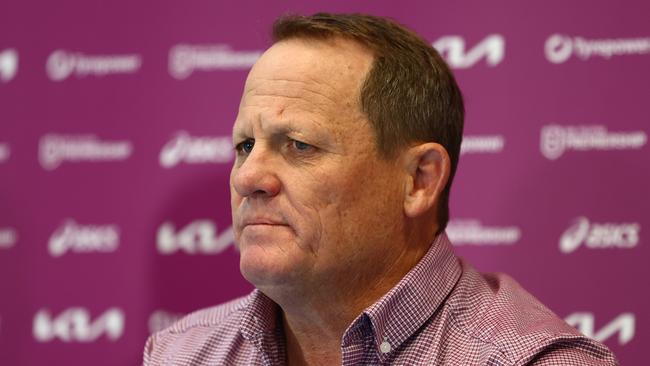
David Nofoaluma will walk back into the Tigers in November with a head full of information learned at the Storm.
Earlier this week Walters denied hip drops were taught at his club, saying it was not taught but had become part of tackle technique.
Maybe it could be just a coincidence that it happens at some clubs far more than others but, regardless, for the sake of the young cruciate ligaments across the country, it needs to stop.
Which is the point the NRL should adopt.
It does not matter whether the hip drop was a technique that was taught, or at which club it might have begun, or even if it somehow naturally evolved, the game must do something about it.
As Alexander suggested, the NRL has been unable to get ahead of the varying tackle techniques that have evolved over the years, like the grapple and crusher and crocodile roll and rolling pin and on it goes …
Others, like the lifting tackle and shoulder charge, were only properly addressed when the NRL brought in rules to specifically stop them and the weeks on the sideline were significantly beefed up.
For the rest of them, the generic rules that fall somewhere in the middle, the NRL clubs navigate these rules like complicated tax laws.
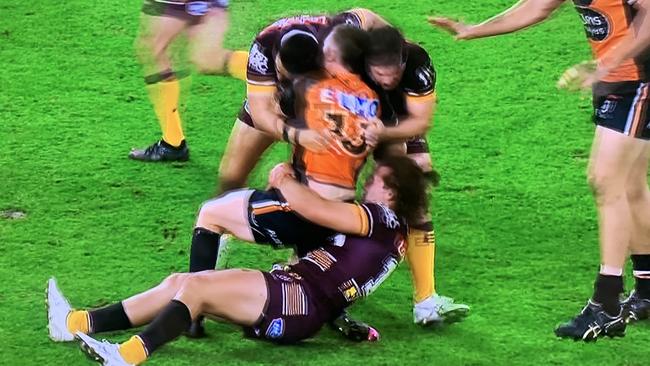
The moment a new rule is introduced they ignore its intent to improve the game and instead look for a loophole in the wording or its description to exploit.
The simple solution is an all-encompassing rule like a Not In The Spirit of the Game rule that says a tackle was not what the game wants to see more of, but which can’t be argued down on technicalities, like poor old Luke Patten trying to explain why “separation” mattered in last week’s Nelson Asofa-Solomona tackle, or why there was not enough force, even though he cracked two teeth.
To do that, though, the game would need to have the faith, or League Central would need the strength to at least indicate the faith, to trust somebody to get it right.
And as we all know The Great Human Comedy, officially known as the Match Review Committee, is getting further away from the proposition rather than closer based on this week’s evidence.
Meantime we watch two of the game’s greats jab and parry, planning their next move.
For a change, the scene is beautiful from the bleachers.
SHORT SHOT: INSIDE KNIGHT’S HR DISASTER
Anybody wanting an idea of all that is going wrong at Newcastle needs only to read the club’s statement after the David Klemmer show cause notice was resolved late Friday.
Be prepared, though, it makes for sad reading.
Particularly the sentence that read, in part, that the Knights had added a new procedure to how the club handled matters to “ensure due process and procedural fairness is consistently applied, including mediation by the director of football prior to escalation of any matters to the Group Chief Executive Officer or Human Resources in future”.
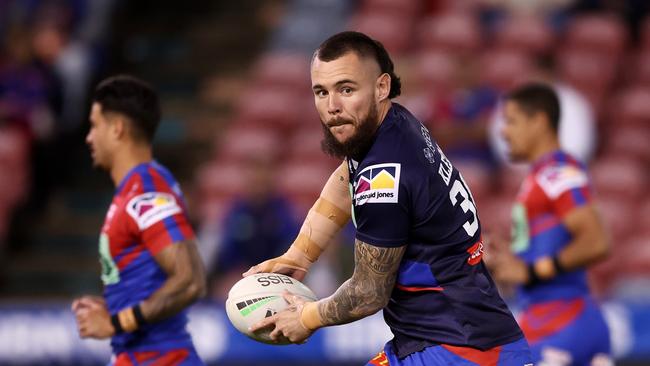
It has emerged the complaint against Klemmer was not made by trainer Hayden Knowles, who his abuse was aimed at when he refused Knowles’s instructions to leave the field, but by somebody in the human resources department.
One day into the future, the death of the Knights will be tracked back to the day the club began to be unofficially run by the HR department and that the smart move would have been to burn it down.
Like it or not, football clubs are high performance places which operate at the extreme end of behaviour, like just about every field that operates at the elite end.
It has to be intense to reach the required level.
They are not government departments, there to assure a fair go for all.
For a player to be stood down after an external complaint by HR, as HR goes through its tiresome investigation, is as far from elite as can be imagined.
Meanwhile, the Knights take on Wests Tigers on Sunday without Klemmer, their season’s best player missing while HR went through its clumsy investigation.
Good grief.
MATTY JOHNS: AN UGLY MESS THAT ONLY THE PLAYERS CAN FIX
It was a decade ago, I was standing on the touchline at Narrabeen Sports Academy watching a schoolboy rugby union match between St Augustine’s Brookvale and Knox College.
I enjoy the school rugby, there’s plenty of ball movement and enterprise, but on this day it’s wet, the field a bog, and the match an 80-minute rolling maul.
I’m standing with a couple of old rugby diehards, and the only bloke who’s enjoying the slogfest more than them is the referee, who’s got his nose in every maul, his whistle poised in his mouth, he’s the centre of attention.
I sigh, frustrated, and remark to one of the diehards: “I wish the ref could get out of the way so the game can get underway.”
The old diehard stares at me and it’s clear I’m about to get a lecture on my ignorance.
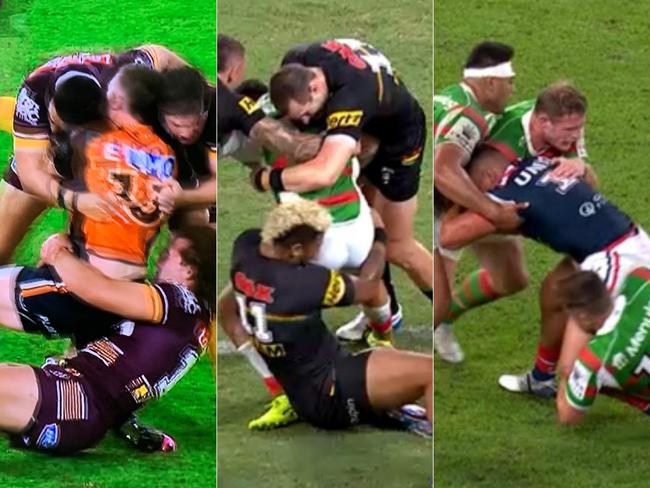
“You league blokes don’t understand, everything which is most important in rugby union is hidden from sight, it sits at the bottom of the maul. Everything which is most important in rugby league is in clear view, in open space.”
In rugby they call those crucial, hidden skills, the ‘Dark Arts.’ Clever techniques, some legal, some not, in winning the ruck and maintaining or regaining possession.
As the iconic dual-international, come commentator, Rex Mossop, would say, regarding the bottom of the ruck and maul: “If it’s got laces rake it back, if it’s got hair stomp on it.”
Modern day rugby league’s ruck is now every bit as important as the 15-a-siders, and the ‘Dark Arts’ being used more sinisterly.
The faster the contest the more important the play-the-ball area. The six again rule has raised the stakes even higher.
If you constantly lose the ruck and can’t control the speed of the opposition play-the-ball, your petrol tank will quickly evaporate, the points against you pile.
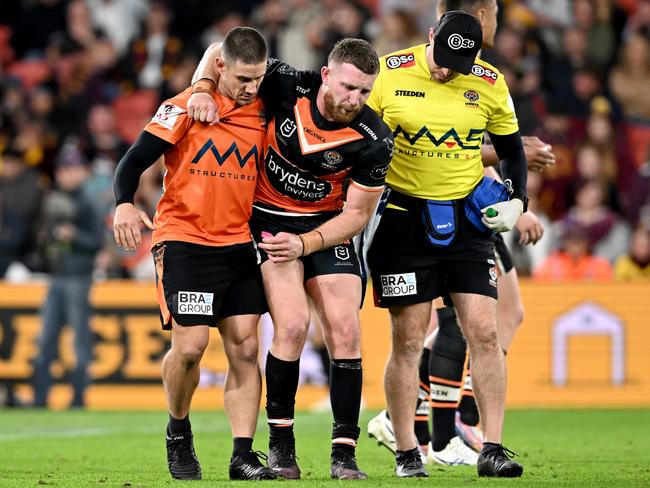
I have no problems whatsoever with defenders testing the patience of a referee. Lying on the tackled player for that extra second is harmless and always been a part of the game, but as we know in the last decade things have become increasingly ugly.
Teams no longer wait till the attacker is on the ground to start the slow down.
What we are seeing is the third man in, completely halting any kind of post contact momentum by wrapping the legs and allowing the defenders up top to control the tackle.
Let me adjust that last statement, some players simply wrap their arms around the attacker, others however spear in violently at the knees and lower limb, and of course the new trend of collapsing the hip onto a player’s lower leg and knee.
The “cannonball” and “hip-drop” tackles are a disgrace.
In the case of the hip-drop, it can be difficult to determine whether an individual did it deliberately or purely by accident, but there’s so much of it suddenly going on, you know it’s the latest appalling ploy some clubs are using.
I cannot believe a player would do such a thing to a fellow professional and risk destroying a career.
If defensive coaches are teaching or encouraging such tactics at clubs, surely it’s time for senior players to stand up and push back.
When the Cannonball tackle first came into the sport, one coach not only encouraged it, but stated to his players, “I want to sit in the grandstand and be able to hear the opposition ball carrier’s scream.”
The captain of the team, a man of character and integrity told the coach to pull his head in and warned the players not to follow his orders.
The RLPA and the players’ representatives need to be vocal in the case of these tackles. How can they sit in a meeting with the NRL and negotiate player welfare, yet remain silent when the men they represent are doing such things to one another.
We look to the NRL and the referees to end these tactics but the problem is that some clubs and players are masterful in the use of the ‘Dark Arts,’ they avoid referee detection.
But other clubs recognise what they’re doing and in the quest to keep up, follow suit.
Suddenly you’ve got players trying to execute these highly dangerous manoeuvres with little or no idea of what they’re doing.
It needs to be removed from the game altogether, and only the clubs and the players themselves can truly do that.
But unfortunately that’s highly unlikely. It seems nothing is more important than the two points every weekend, even player welfare.
AND ANOTHER THING
I wrote last week that I feared if the Dogs beat the Knights in Newcastle last Sunday, then things could turn ugly into the close of the season, and unfortunately the last five days have been exactly that.
I can’t be too critical of Adam O’Brien’s post-match press conference, he’s a man who at the moment is searching for answers, responding to a fan base who are asking a lot of questions.
Then we have the David Klemmer situation which has the ability to cause a split in the club and needs resolving yesterday. I don’t agree with standing him down.
The Knights are a grim-faced lot, and have been for most of the season.
The answer isn’t working harder, they’ve been doing that and the hole’s getting deeper.
They need to take a leaf out of the Bulldogs book, change up training, reduce the analysis, inject a bit of daring into the game plan, and make it feel like a sport, not like a job.




